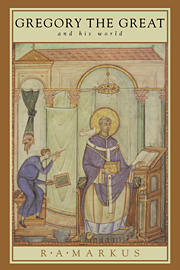Book contents
- Frontmatter
- Contents
- Preface
- List of abbreviations
- Maps
- 1 Introduction: a contemplative in a troubled world
- 2 Integritas animi: ministry in the Church
- 3 Sapienter indoctus: scriptural understanding
- 4 Appropinquante mundi termino: the world in its old age
- 5 The Christian community and its neighbours
- 6 Christiana respublica: within the confines of the Empire
- 7 Terra mea: Italy between two worlds
- 8 Argus luminosissimus: the pope as landlord
- 9 Scissum corpus: the schism of the Three Chapters
- 10 Ravenna and Rome: and beyond
- 11 In cunctis mundipartibus: the far West
- 12 Inconcussam servare provinciam: dissent in Africa
- Epilogue
- Appendix On the distribution of Gregory's correspondence
- Glossary of terms for offices
- Sources
- Secondary works referred to
- Index of Gregorian texts
- General index
3 - Sapienter indoctus: scriptural understanding
Published online by Cambridge University Press: 05 June 2012
- Frontmatter
- Contents
- Preface
- List of abbreviations
- Maps
- 1 Introduction: a contemplative in a troubled world
- 2 Integritas animi: ministry in the Church
- 3 Sapienter indoctus: scriptural understanding
- 4 Appropinquante mundi termino: the world in its old age
- 5 The Christian community and its neighbours
- 6 Christiana respublica: within the confines of the Empire
- 7 Terra mea: Italy between two worlds
- 8 Argus luminosissimus: the pope as landlord
- 9 Scissum corpus: the schism of the Three Chapters
- 10 Ravenna and Rome: and beyond
- 11 In cunctis mundipartibus: the far West
- 12 Inconcussam servare provinciam: dissent in Africa
- Epilogue
- Appendix On the distribution of Gregory's correspondence
- Glossary of terms for offices
- Sources
- Secondary works referred to
- Index of Gregorian texts
- General index
Summary
EDUCATION AND LETTERS
Reflecting on one of his stories of holy men, Gregory compared a rather simple-minded saint's ‘learned ignorance’ (illius doctam ignorantiam) with ‘our ignorant knowledge’ (nostra indocta scientia). Since St Paul (1 Cor. 1:18–25) paradoxical expressions such as this were readily used to sum up the Christian ideal of learning in relation to holiness. They tell us no more about their subject than that in the eyes of the narrator he or she met the standard required for holiness; and that the narrator's description is made in a Christian and Pauline, probably an ascetic, perspective. To assess either the extent of the knowledge at any individual's disposal, or the value set upon it, the formula helps very little. Gregory's description of Benedict as ‘wisely unlearned’ (sapienter indoctus) tells us he thought Benedict a saint; it does not tell us what he thought of learning.
By the standards of his time and place, Italy in the late sixth century, Gregory can only be reckoned to have belonged to the best educated élite. We know nothing about his education; nor did Gregory of Tours, who described him as so well educated ‘that he was thought second to none in the City’. The golden age of Boethius and Cassiodorus had passed before Gregory was born; the revival of learning in the Visigothic kingdom of which Isidore of Seville is the most eloquent witness had not yet begun.
Information
- Type
- Chapter
- Information
- Gregory the Great and his World , pp. 34 - 50Publisher: Cambridge University PressPrint publication year: 1997
